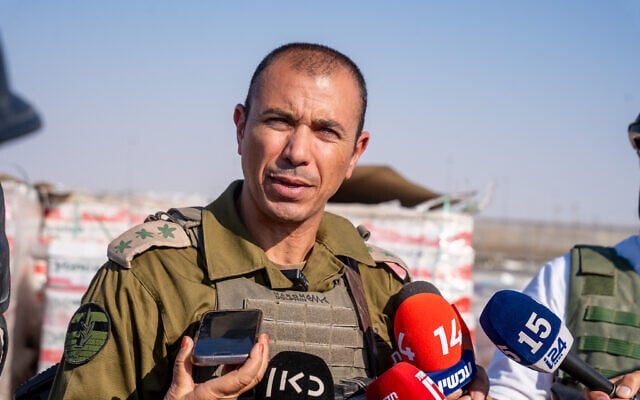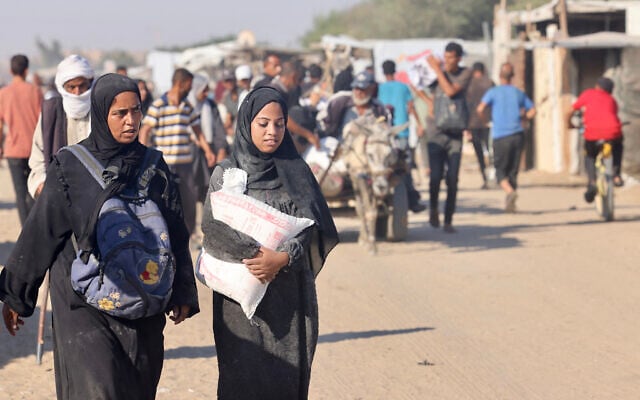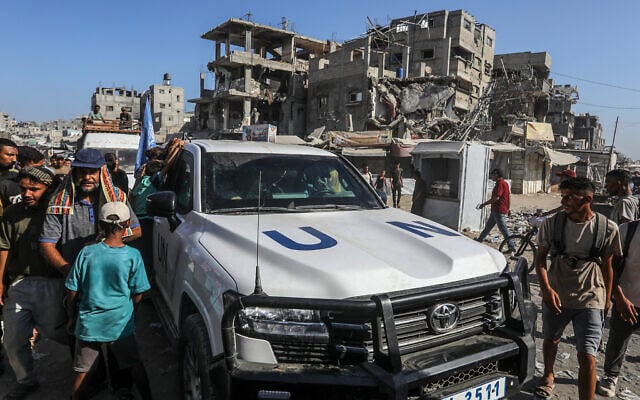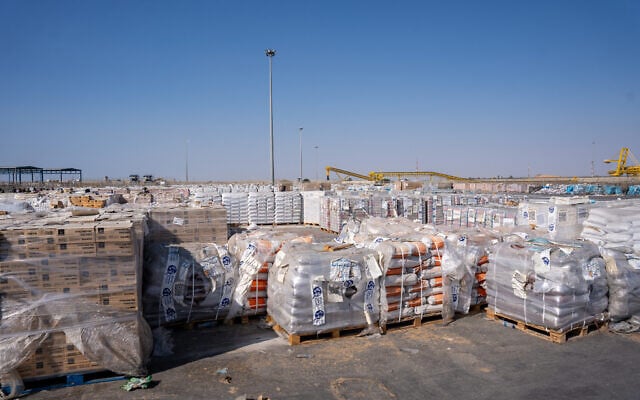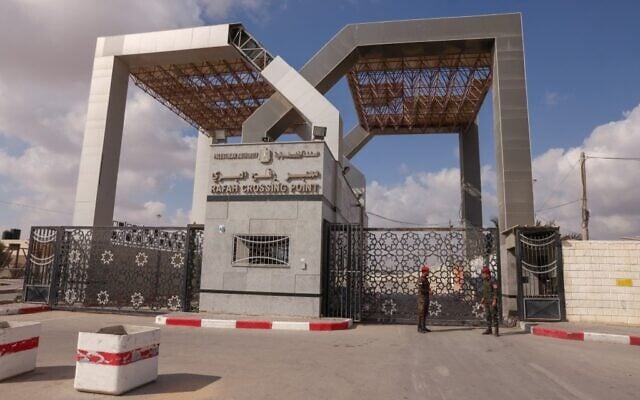


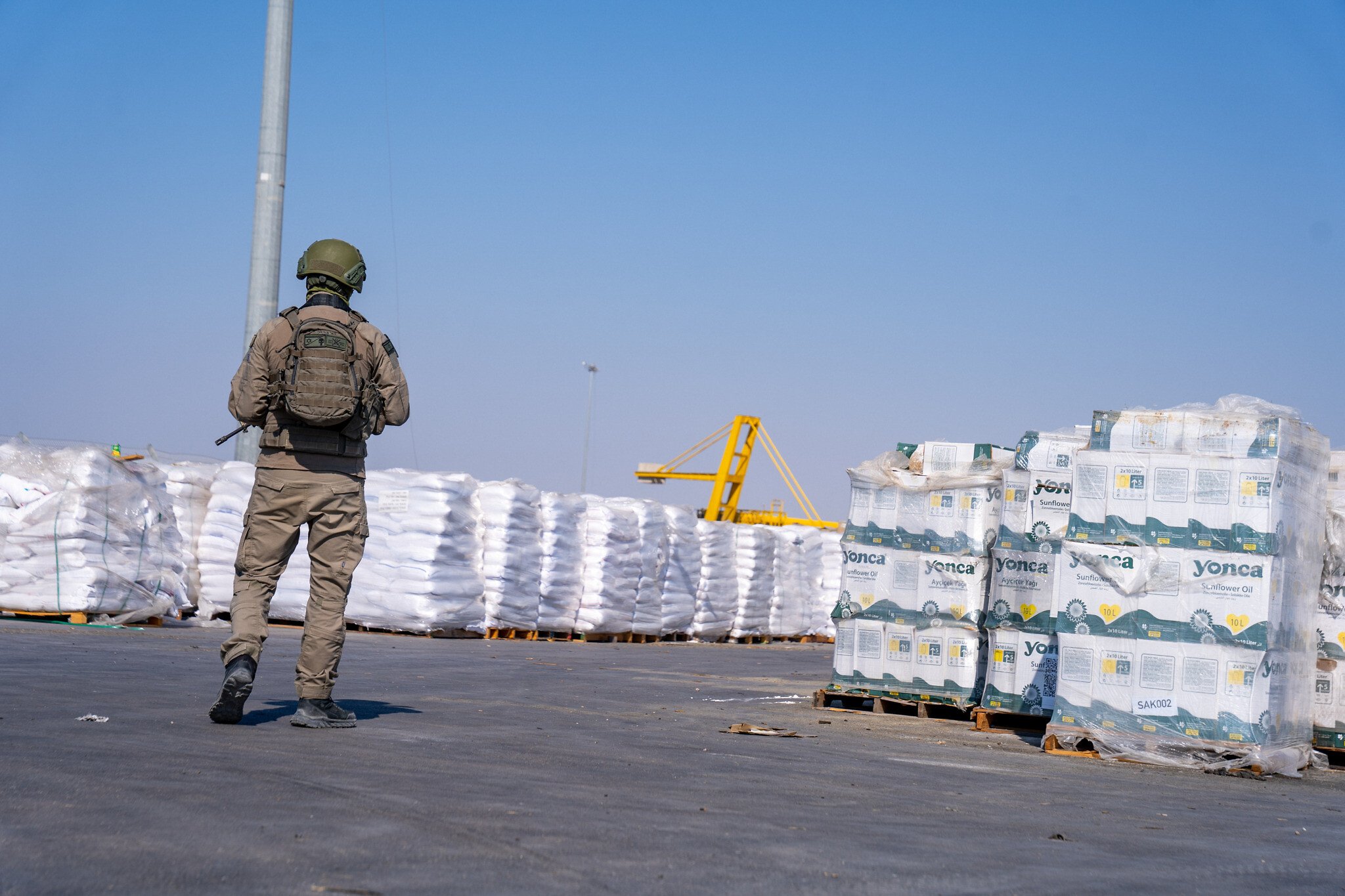
Israel on Thursday blamed a “lack of cooperation from the international community” for the limited aid entering the Gaza Strip while dismissing Hamas’s “famine narrative” as a tactic used in the hostage talks.
Speaking to reporters on the Gaza side of the Kerem Shalom Crossing, Col. Abdullah Halabi, head of COGAT’s Coordination and Liaison Administration for Gaza, said that approximately 1,000 trucks’ worth of aid are piled up inside the Strip, awaiting collection by the United Nations and aid groups.
The senior officer in the Coordinator of Government Activities in the Territories said truckloads are waiting on the Gaza side of the crossing “due to a lack of cooperation from the international community and international organizations.”
“We have seen in the last two days a slight improvement in their work, especially in the UN’s position and the UN’s organizations. We invited them here as we have done several times to continue to encourage them, to check together with them what can be done to transfer this aid in,” he said.
The UN has repeatedly claimed that COGAT has refused its requests for collection and distribution authorization, and that dangerous and complex conditions inside Gaza made aid distribution very difficult.
Amid the issues, aid groups and world leaders have protested that starvation is spreading and must be urgently addressed. A report by the UN Office for the Coordination of Humanitarian Affairs on Thursday said 9 percent of 56,440 children under the age of five screened in Gaza clinics were found to be suffering from severe malnutrition, compared to 6% a month prior.
Halabi said Israeli moves in recent weeks to facilitate the delivery of aid include “expanding” the Kerem Shalom Crossing, and opening up three other terminals in the north and center of the Strip.
“We allowed longer work hours, and we took all the necessary steps to allow the international community to bring a very large amount of humanitarian aid into [Gaza], to combat the famine narrative, which Hamas uses to fight against us,” he said.
“The State of Israel allows the entry of humanitarian aid beyond the standards of international law, without restriction. As long as the international community makes an effort to bring in the aid, we will allow them to bring it in,” he continued.
According to Halabi, the military and COGAT have identified an “intense and violent campaign” by Hamas against Israel’s humanitarian aid mechanism.
“This campaign is based on lies,” he said, referring to claims of widespread starvation in Gaza. “It was created not to help Gaza’s population receive the aid, but primarily to improve Hamas’s standings in the [hostage] negotiations that are taking place over the last few days, and it is using different means, in particular the famine narrative, to improve their standings.”
Halabi noted recent reported attacks by Hamas against the new aid distribution sites, run by the Israel- and US-backed Gaza Humanitarian Foundation, accusing Hamas of working “to create chaos and to create a reality in which the humanitarian situation is depicted poorly.”
The UN has said more than 1,000 people have been killed at aid distribution centers since May, many of them at GHF sites. Israel says those figures are inflated, though it has acknowledged firing at crowds. It has not provided alternative numbers.
Israel and GHF have accused Hamas of trying to disrupt the aid operation, with the Israel Defense Forces saying the terror group fired a rocket at one of the distribution sites on Wednesday night.
The UN and major aid groups have refused to work with the GHF over concerns that it was designed to cater to Israeli military objectives and violates basic humanitarian principles.
The depiction of the humanitarian situation in Gaza “doesn’t correspond with the 4,500 trucks that entered in the last two months, carrying everything, from personal humanitarian aid for families to medical equipment, hygienic supplies, and more,” Halabi claimed.
“We, the army and COGAT, will continue doing whatever is possible and necessary, improve the relevant conditions, strengthen our relationship with the international community and with the different humanitarian organizations, and help them to allow the entry of aid,” he continued.
“We are fighting Hamas, we will continue to fight Hamas. We will not allow a reality in which Hamas uses anything, whether it is humanitarian aid or any other means, to strengthen its interests or itself,” Halabi said.
Separately, Prime Minister Benjamin Netanyahu was set to hold an urgent meeting in Jerusalem on the allegations that there is starvation in Gaza, an Israeli official told The Times of Israel.
The premier will be joined by representatives from the Foreign Ministry, COGAT, the National Security Council, and others.
The allegations and larger issue of getting aid to Gazan civilians dominated discussions in the Prime Minister’s Office on Thursday, the official said, on condition of anonymity.
The United Nations said Thursday it did not know how many truckloads of aid were awaiting distribution inside the Gaza Strip because Israel has not granted it access.
“Despite our repeated requests, Israel has not allowed the UN to be present at the crossings, which are militarized areas,” said Jens Laerke, spokesman for the UN humanitarian agency OCHA.
“We therefore cannot verify the amount of supplies currently at the crossing,” he told AFP.
Laerke explained that the UN needed multiple approvals from the Israeli authorities: firstly, to get aid across the border from Israel into the Gaza Strip, where it is dropped off — the trucks returning to Israel — followed by another approval to drive trucks from inside Gaza to collect it.
However, “it is not just about denials of requests to pick up the cargo,” Laerke added.
“Israel — as the occupying power and a party to the conflict — must facilitate humanitarian operations all the way till it reaches people who need it to survive.”
This means “they must provide the green light for trucks without unnecessary delays; allow teams to use multiple, safer routes; and order troops to stay away from the convoys, and never shoot at civilians along the allocated routes — or anywhere else,” Laerke explained.
“Without the full set of conditions in place, safe and principled delivery cannot take place at scale. So even when approved, those missions are often impeded on the ground.”
Meanwhile, the US State Department said it was continually working to get more aid into Gaza without it being looted by Hamas.
The department’s deputy spokesperson, Tommy Pigott, accused Hamas of “weaponization” of aid through looting during a regular press briefing and added: “We have a system in place, attempting to get as much aid into Gaza as possible in a way where is not being looted by Hamas … that is the reality that we’re pushing for — trying to get as much aid in there as we possible.”
Meanwhile, a key Hamas official who helped the group bring in arms was killed in an Israeli airstrike in southern Gaza’s Khan Younis earlier Thursday, the IDF announced.
Muhammad al-Amour, according to the military, was responsible for the goods terminal at the Rafah Crossing between Egypt and Gaza. “As part of his role, he oversaw the smuggling of hundreds of weapons and military equipment into the Gaza Strip, directly contributing to Hamas’s military buildup,” the IDF said.
Over the years, the military said Amour “played a key role in the smuggling network of Hamas’s military wing, coordinating and leading efforts to bring weapons into the Gaza Strip and to Hamas with the help of collaborators.”
The Rafah Crossing, which Israel took over in May 2024 and has since razed, “served as a gateway for smuggling military equipment and weapons into the Gaza Strip,” the IDF said.
Additionally, eight IDF soldiers were wounded, including two moderately and six lightly, in an “operational accident” in the northern Gaza Strip earlier today, the military said
The troops were taken to a hospital, and their families were notified, the army added.
Amid efforts to reach a ceasefire-hostage release deal, Israel on Thursday said it was returning its negotiators back home for consultations after Hamas’s response to a proposal for an agreement. The United States said it was pulling its mediators from Doha, with special envoy to the Mideast Steve Witkoff stating that Hamas’s response showed it lacked the desire to reach a deal.
An Arab diplomat and a second source involved in mediation efforts told The Times of Israel that Hamas’s response was constructive enough to enable the sides to move forward.
The war began with the Hamas-led October 7, 2023, massacre, in which invaders killed some 1,200 people in southern Israel and took 251 hostages. Terror groups in the Gaza Strip are holding 50 hostages, at least 20 of whom are thought to be alive.
The Hamas-run Gaza health ministry says nearly 60,000 people in the Strip have been killed or are presumed dead in the fighting so far, though the toll cannot be verified. As of January, Israel said it had killed some 20,000 combatants in battle, and another 1,600 terrorists inside Israel during the October 7 onslaught.
Israel says it seeks to minimize civilian fatalities and stresses that Hamas uses Gaza’s civilians as human shields, fighting from civilian areas including homes, hospitals, schools, and mosques. Israel’s toll in the ground offensive against Hamas in Gaza and in military operations along the border with the Strip stands at 456.
Jacob Magid contributed to this report.

